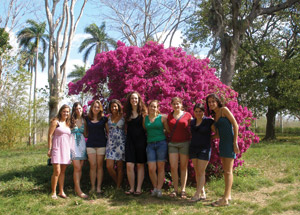mez | Scene
A reminiscence of a Cuban excursion
 Courtesy of Bill Little
Courtesy of Bill Little Freshmen in the FOCUS class Stranger than Paradise: Cuban Experiences of Revolution explored Cuba during spring break.
While you may have spent your spring break catching up on homework or watching TV, 14 freshmen in professor Joseph Schraibman’s FOCUS class Stranger than Paradise: Cuban Experiences of Revolution spent their break in Cuba. The students had learned about the history of Cuba from colonialism to communism during the fall semester and studied Cuban cultural issues this semester. The goal of the trip was to allow the students to have an interactive experience with the culture they had been studying in depth throughout the year. The students were also encouraged to practice their Spanish communication skills.
After speaking with students who went on the trip, I learned that most of them originally held the typical views our generation has of Cuba—a country wrought with poverty, stifled by communism and crumbling to the ground. Steve Fuller, one of the 14 travelers, said he expected “animosity towards Americans, and people angry about living in poverty.” To his surprise and relief, many of the Cubans the group encountered welcomed the college students with open arms, hospitality and a vehement curiosity about life in America.
The greatest reward the trip provided was the opportunity for students to witness a society shrouded in stereotypes of mystery and hostility. The very first experience the students had was getting off the plane and walking through a group of completely silent people, who had been eagerly awaiting the arrival of loved ones they probably had not seen for years; right away, the students understood the difficulties faced by families who are completely cut off from the outside world. Upon entering the city of Havana, Antonya Gonzalez said she immediately noticed that all the vehicles parked on the road were straight out of the 1950s and ’60s; this is due to the embargo enacted in 1962 under the Kennedy administration.
While staying in Havana for four nights, the students had the opportunity to experience the Cuban lifestyle firsthand. One family across the street from their hotel let some students into the home, which was a tiny two-bedroom apartment with a bathroom. Most people in Cuba work low-paying jobs, even lower than the worst-case scenario in the U.S. Something else that shocked the students was the lack of Internet and phone access. Cell phones are non-existent, while landlines and the Internet are too expensive for the general population. Instead, the most widespread way of communicating is for people to wait in the streets, hoping that a friend may come by. Nevertheless, the majority of students said they were able to deal with the different environment.
During the trip, the students learned about Cubans’ varied attitudes toward the communist regime in present-day Cuba. Most of the elderly people with whom they spoke either did not divulge their opinions on the government or were staunch Communist Party supporters. One older gentleman revealed that he had experienced the revolution and thought it accomplished everything it was supposed to, save some minor things. On the other hand, young students at the University of Havana believed that the tragic situation in Cuba is largely due to Castro’s unconditional and unyielding control of the government. Our generation of Cubans seeks a government that is not necessarily like the American system, but one that does not restrict ordinary citizens’ access to the outside world.
Though students explained that some American stereotypes of Cuba ring true, it seems as though we should not lose hope for a better Cuban future. Many Cubans still attend school and seek higher education, even with no expectation of receiving a job better than that of a waiter. Also, though Cuban people do not necessarily like or agree with the U.S. government, most Cubans do not treat Americans they encounter with hatred; they are able to separate the people from the government, as they would want us to do with them.
The students also learned some astounding and unexpected realities of Cuba, including the fact that the Cuban people did not know about the 9/11 attacks until eight days after they happened. Furthermore, the U.S. is the fifth largest importer from Cuba. Thus, educated Cubans learn that the U.S. provides them with a large percentage of their income and appreciate the capitalist nature of the U.S. economy. Cubans are still taught in school that capitalism is inefficient and corrupt, however, while communism is for the people and will bring them security and happiness.
Students described the FOCUS trip to Cuba as an experience of a lifetime and were fortunate to have had the opportunity. Expeditions to enigmatic countries such as Cuba afford students the ability to truly understand and learn from a culture that is off-limits to most Americans.
